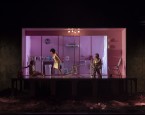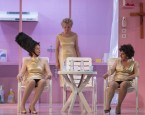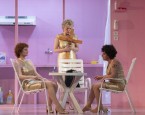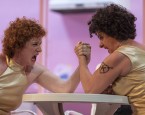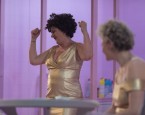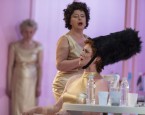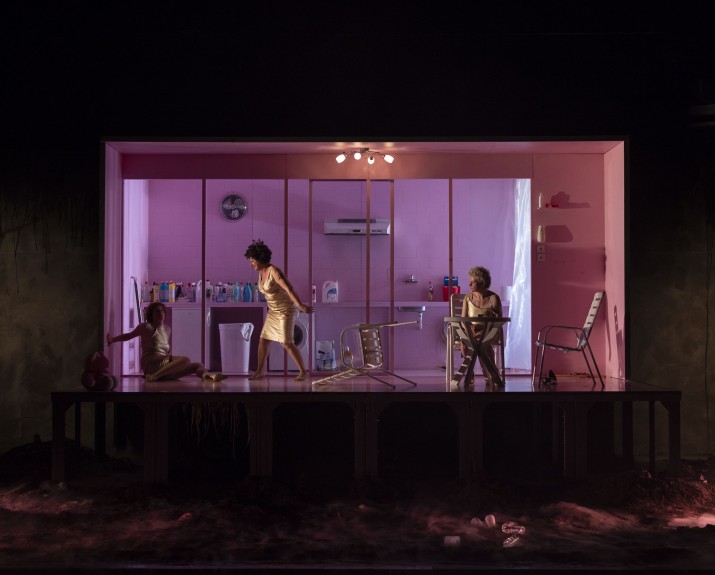
Premiere THE PRESIDENTSWerner Schwab
The Presidents are the first play of the famous Austrian playwright Werner Schwab, one of the top contemporary Austrian dramatists. Schwab’s writing is closest to the grotesque genre so that his dramatic world is always on the border of the bitter serious and funny, thus skilfully continuing the tradition of the Austrian Black comedy. Presenting a contorted view of equally ugliness and beauty of the contemporary world, Schwab introduces three characters in The Presidents, namely, Erna, Greta and Mariška, who are the sweepers of our rubbish, also our filthy conscience. Tragic and comic at the same time, the anti-heroines are at moments banal, vulgar and cruel, soon after humiliated, alone and aghast at life that might have betrayed them or vice versa. You have to live, says one of them, no one was a Nazi in our country, says the second one, let’s forget all this dirt of life, the third one, upon which they open a bottle of wine and dream of a celebration at which their world still looks more appealing and that still can make us smile, although with our mouth full. Next to Olivera Baljak and Tanja Smoje, the play also features Katarina Bistrović Darvaš, a guest from Zagreb.
Running time:
The performance lasts 1 hour and 30 minutes.
Interview with the director
BOJANA LAZIĆ
HIDING, PAIN AND FURY
The three female presidents are presidents of – what?
To put it simply, Erna, Greta and Mariedl are the presidents of small bourgeois lives, social hypocrisy and repressed instincts.
Why should anyone have ever thought that The Presidents couldn’t be staged? Why was the play staged a year after having given rise to a scandal? For instance, the management of the Vienna BurgTheater said the involuntary comic effects were the result of the author’s lack of language skills, while nowadays the play is said to be a masterpiece provoking the catharsis to be compared to the one of the Greek tragedy.
It’s hard for me to answer this question, but I can assume that the language of this piece must have been absolutely ruthless and a blasphemy. However, quite soon after the first staging of The Presidents and the scandal that followed, one part of the bourgeois Vienna was shocked while the other part of the audience and artistic circles supported Schwab precisely due to his ruthless and rebellious attitude concerning ossified circles of high culture and the uncritical adoration of their own imperial splendour. In this comedy I can recognise the impact of radical art movements as punk or Vienna activism. The presidents also belong to the tradition of Austrian literature that, in popular usage, spits on its own country. The disgust of authors as Jelinek, Bernhard, Kroetz and many others, towards the ignoring and hiding of the Nazi past, the approval in fact of the ideas of fascism, is shared by Schwab himself.
None of the above mentioned authors found it easy in the beginnong while the recognition came later, however, what is important is that it did come. Today Werner Schwab is a classic of Austrian literature and the theatre of German language.
The issues that Greta, Erna and Marijedl get into in their bourgeois, shallow, vulgar and sick humour conversations were written in the late 1980’s. What do they mean to us today?
The main theme of our staging is hiding. Nowadays, just as it was in the times when this piece was written, it is behind a petty bourgeois, a highly divided and overemphasised religious society that serious fascism is hiding, camouflaged by the obsession with god and morality. It is precisely due to the continuous hiding of the truth, the “hidden skeletons in the closet”, that violence, pain and fury gush forth.
What is your experience from the work with actresses Olivera Baljak, Tanja Smoje and Katarina Bistrović Darvaš?
The work process of this staging was ardent, hard, emotional, inspirational, touching, mountainous and rugged, investigative, eruptive, intoxicating, in the state of trance… It was a process in which I demanded a lot, received a lot and gave a lot. Olivera, Tanja and Katarina are actresses that believe in the theatre and sincerely enjoy the play. They are ready to experiment and let themselves go, courageously and without reserve. The three of them are passionate, charismatic and hypersensitive artists. In short, they are all that no president, female or male, is or will ever be.
What/who is being cleaned by this performance?
Cleaning is a kind of catharsis. If there is only one spectator or one performer to experience it, we can be proud of having had a good performance.
What did the team of this staging have to get through for such The Presidents?
Well, first of all, it was the very text, hard to translate plays on words, torrents of words and dramatic structure. What Schwab’s language has had removed are beauty, purity and decency, all other aesthetic and ethical concepts honoured by the Christian bourgeois culture. Thus, it is the language of a society beyond social norms, language that refuses communication unless it is used as an attack, also the language that exhausts itself in the pain and fury.
We spent a month doing the table read rehearsing, as it seemed necessary to decipher that forest of signs carefully. Such an approach enabled us not to fall into the trap of a staging stereotype of this play, a grotesque, but also to find a key for exciting stage setting solutions.
A favourite sentence from the text or a favourite Schwab’s sentence?
We have to be able to bear the truth. Firm on the feet, even if they may swell…
Andrea Labik
Werner Schwab was a great punker, throughout, in all areas devoted to the direct confrontation with the (small) bourgeois cultural milieu from which he descended. Irreparably disgusted with the Austrian high culture and society, on the one hand he belongs to the long tradition of Austrian literary authors, both female and male, who throughout their entire work had a critical relation to their country, primarily because of its ignoring or implicitly approving of its imperial and Nazi past. On the other hand, we can contextualise him as the inheritor of one of the most significant phenomena of the Austrian contemporary art of the twentieth century, the Vienna activism, in a way considered to be the art of the social scandal, the art that through insisting on the stripped corporeity and its atypical presence in the public space confronts the bourgeois society and its rules of good manners. The activist, insomuch also Schwab’s interventions in the public space and scandals in it, represent a first-rate art and political act for the (small) bourgeois society.
This is also the case with Schwab’s first piece, in which the disgust for the body and its secretions is manipulated and gloated with in the very language of the drama. It keeps overemphasising the corporeity that is always looked upon by (petty) bourgeois milieus, the church and conservative ideological apparatus with outrage and contempt. The Presidents describe a dark and cruel, yet immensely funny world. Within a multitude of uttered words, the possibility of a dialogue or any real communication is altogether impaired. The heroines utter words as if it was a matter of the flood taking with it all that is alive, filled with garbage, sewage and excrement. Schwab’s language is the language of the society beyond social norms.
The bourgeois society that presents itself as untainted, highly moral and highly aesthetic, represses hypocritically its instincts that are beyond the spirituality and beauty. The tendency for these repressed instincts is mainly projected to lower classes, people insufficiently mature to tear themselves away, people insufficiently cultured, insufficiently educated and prone to the rules of wilderness. It is The Presidents themselves that ironically play on this projection of socially unacceptable manifestations onto lower classes. Although Erna, Greta and Mariedl are women from lower classes who continually talk about the basic functions of human body, what Schwab is making fun of are not lower classes themselves, but ignorant bourgeois projection of the dirt on them. The Presidents turn things upside down; while the talk about the body is freely expanding, the repressed instincts are no longer physical but ideological. In The Presidents, fascism is present in the society just as excrements are. Just as it is with body excrements, each body is subject to it, and just as the body excrements, it is omnipresent. The faeces in this drama function as a kind of social unconscious, now just gushing forth to the surface. However, what is worst is that it infinitely keeps reviving.
Olga Dimitrijević, dramaturge


